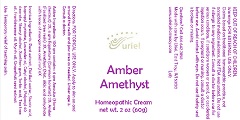
Amber Amethyst Cream while Breastfeeding
What is Amber Amethyst Cream used for?
Brief: Use: Temporary relief of teething pain.
Is Amber Amethyst Cream usage safe while breastfeeding? If a lactating mother is using it can there be any effect on growth or development of infant?

Amber Amethyst Cream Breastfeeding Analsys
Horse chestnut while Breastfeeding
SafeCAS Number: 8053-39-2
The seeds, bark and leaves are used. It contains Aescin and esculin (see specific info), with a vasoprotector effect and devoid of toxicity at normal doses. At latest update no published data on excretion into breast milk was found. Side effects are rare and mild.The Commission E of German Ministry of Health does not contraindicate the use of seed extract during infancy. Given its lack of toxicity at normal doses, a moderate consumption during lactation would pose a very low risk. For topical preparations, do not apply it on the chest or thoroughly clean it up before breastfeeding. See below the information of these related products:
Equisetum arvense top while Breastfeeding
UnsafeCAS Number: 71011-23-9
On latest update no relevant published data on breastfeeding were found. Side effects and toxicity have not been tested, therefore its use would be preferably avoided or as much use it infrequently. Topical use is compatible with breastfeeding whenever it not used on the nipple. Stems of horsetail are used. It contains mineral salts (Sílicium, Potassium), flavonoids and steroids. Unproven effects are: diuretic, wound healing for burning injuries. Prolonged or abusive use may produce gastritis, vomiting, sea-sickness or stupor. May be confused with Equisetum palustre which is toxic due to that it contains Thiaminase and be cause of severe Vitamin B1 deficiency. A case possibly related to the appearance of Autism after the prolonged use in pregnancy has been described.
Silicon dioxide while Breastfeeding
SafeA polymer made out of silicon-oxygen-methyl combination with a high molecular weight, water repellent and low superficial tension. It is used in many ways (dimethicone, simethicone, -see specific items)orally to treat infant colic and flatulence; as pediculicide, in cosmetic creams and lotions and skin protectants as to prevent ulcers and scars; arthroplasties, retinal detachments and reconstruction or cosmetic surgery as injections and implants. Silicone is widely distributed in our environment with several cosmetic and medicinal uses. No evidence of toxicity on human tissues has been shown. A 1994 report on immunological side effects in infants breastfed by mothers with silicone implants, was denied categorically by means of meta-analysis and other work. The absorption by oral or dermal route is negligible. Both a high molecular weight and polymer molecular structure make it practically impossible excretion in the milk and hence a significant amount of intestinal absorption by the infant. Those circumstances make silicone implants safe for lactation even if broken or manufacturing fault (Poly Implant Prothèse, PIP). After extensive analysis of such silicone prosthesis, where lack of health risk was demonstrated, it can be concluded that many of the initial recommendations published lacked scientific validity, including that carriers of such prosthesis should not breastfeed. Silicon levels in blood and milk of women with implants (55 ng / ml) are similar to those of women without implants (51 ng / ml), 13 times lower than that found in cow's milk (709 ng / ml) and 80 times lower than in commercial infant formulas (4403 ng / ml). American Academy of Pediatrics: Product usually compatible with breastfeeding. To view other possible effects on breastfeeding of breast implant unrelated to silicone, see the term 'Augmentation Mammoplasty'. See below the information of these related products:
What if I already have used Amber Amethyst Cream?
Due to high dilution of ingredients in homeopathic medicines they do not create much problem for baby. Amber Amethyst Cream is a homeopathic medicine and if your baby does not have any abnormal symptoms then there is nothing to worry about. Be careful with too much usage of ethanol based homeopathic medicines during breastfeeding.
I am nursing mother and my doctor has suggested me to use Amber Amethyst Cream, is it safe?
Homeopathic medicines are usually safe in breastfeeding and if Amber Amethyst Cream has been recommended by doctor then there should be no concern about its usage in breastfeeding.
If I am using Amber Amethyst Cream, will my baby need extra monitoring?
Not exactly.
Who can I talk to if I have questions about usage of Amber Amethyst Cream in breastfeeding?
US
National Womens Health and Breastfeeding Helpline: 800-994-9662 (TDD 888-220-5446) 9 a.m. and 6 p.m. ET, Monday through Friday
UK
National Breastfeeding Helpline: 0300-100-0212 9.30am to 9.30pm, daily
Association of Breastfeeding Mothers: 0300-330-5453
La Leche League: 0345-120-2918
The Breastfeeding Network supporter line in Bengali and Sylheti: 0300-456-2421
National Childbirth Trust (NCT): 0300-330-0700
Australia
National Breastfeeding Helpline: 1800-686-268 24 hours a day, 7 days a week
Canada
Telehealth Ontario for breastfeeding: 1-866-797-0000 24 hours a day, 7 days a week
